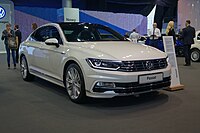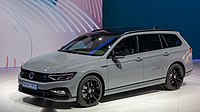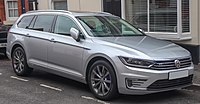|
Volkswagen Passat (B8)
The Volkswagen Passat (B8) is a mid-size car / large family car (D-segment) manufactured by Volkswagen since 2014, replacing the Passat B6/B7 models. It is available in a 4-door saloon and a 5-door estate sold as "Variant" in some markets. It was first introduced at the Volkswagen Design Center Potsdam on 3 July 2014.[2] The B8 is the eighth-generation model in the Volkswagen Passat series and the first passenger vehicle of Volkswagen Group to be based on an enlarged version of the MQB platform.[3] A facelift model was revealed in February 2019, changes include updated front and rear fascias with new lighting, the interior received the MIB3 infotainment system and updated graphics from the instrument cluster, new safety features, and updated engine line-up.[4][5] For the European market, the B8 was assembled in the Emden and Zwickau Volkswagen production plants in Germany.[6] Sales of European domestic market models began in November 2014.[7] The GTE, a plug-in hybrid version, was introduced at the 2014 Paris Motor Show for sale during the second half of 2015 in Europe.[8] DesignDevelopmentBeing based on the stretched variant of the MQB platform, a modular automobile construction platform designed for transverse, front-engined cars, the B8 Passat has more interior space than the last-generation model despite being shorter and 18 mm lower. The front wheels were moved forward and the wheelbase extended by 79 mm resulting in a shorter front overhang and a bigger cabin.[9] The B8 Passat weighs 73 kg less than the previous version by using aluminium vacuum-formed steel.[3]
Driving assistancesThe B8 Passat is available with optional assistance systems including "Front Assist", "Pedestrian Detection", "Side Assist", "Emergency Assist", "Traffic Jam Assist" and "Trailer Assist". Front assistanceThe system uses a long-range radar at the front of the car to detect vehicles up to 80 m ahead which the car is likely to hit unless action is taken. The information from the front radar is relayed to the driver. Up to 30 km/h the system can detect moving and stationary objects and apply full braking power. In moving traffic, between 30 km/h and 200 km/h, the system applies its full capacity of driver warnings, partial braking and brake assistance.[10] Emergency assistanceThis assistant tries to detect a sleeping/unconscious driver. It will attempt to reactivate the driver after steering feedback has not been detected for a period of time and will also transmit warning signals to its nearby surroundings. If the reactivation has failed, the vehicle will be stopped at a safe location. Traffic congestion assistanceThe traffic congestion assistance is capable of moving the vehicle in a traffic jam as long as the average speed does not exceed 60 km/h.[11] Trailer assistanceThe system allows automatic parking with an attached tow trailer.[12] Safety
PowertrainsThe B8 Passat was initially available with two TSI petrol and four TDI diesel powertrains that produce more power than their equivalents from the B7 without changing displacement. The 2.0 TDI engine is available in three configurations, with two being equipped with selective catalytic reduction (SCR) catalysators to reduce the emission of nitrogen oxide. Every engine with the exception of the SCR-equipped 2.0 TDI engines is mated to a six-speed transmission with an optional six-speed or seven-speed dual-clutch transmission. A 4Motion all-wheel drive drivetrain is available as standard for the strongest SCR TDI and TSI engines and optional for the mid-tier SCR TDI variant.[14] Every engine is based on 4Motion/BlueMotion Technology and is turbocharged inline-four. In 2015, four additional petrol and two diesel engines became available.[15] In 2015, Passat received two more powerful petrol engines, marketing it as Passat R-Line, which was however shortly thereafter discontinued.[16]
Passat GTEThe plug-in hybrid powertrain of the Passat GTE, previously utilised by the Volkswagen Golf GTE and Audi A3 Sportback e-tron, is featured with a larger battery pack in this model. The GTE has an 85 kW three-phase permanent magnet synchronous electric motor, coupled with a 9.9 kWh lithium-ion battery capable of an all-electric range of 50 km (31 mi) and a total range of 965 km (600 mi). When paired with the 1.4 liter ACT-equipped TSI petrol engine, it will deliver a fuel economy of 2.0 L/100 km (140 mpg‑imp; 120 mpg‑US) equivalent on the New European Driving Cycle, corresponding to CO2 emissions lower than 38g/km. Top speed is 219 km/h (136 mph). The trunk size is reduced from 650 liters to 483 liters in the "Variant" stationwagon, compared to non-hybrid Passats, a reduction of 167 liters, due to the battery pack. In 2020, a facelift was introduced, and the battery pack size increased from 9,9 kWh to 13 kWh.[18][19] The range has increased to 55 km (34 mi, WLTP) or about 70 km (44 mi, NEDC),[20] compared to the pre-facelift Passat GTE's range of 50 km (31 mi, NEDC).[21] The rear end now has P A S S A T written over the tailgate with large letters, and the interior analog clock has been replaced with a black plastic piece with the hazard lights switch and P A S S A T written on it. The "Battery Charge" function in the infotainment system, which charges the battery using the petrol engine, has been removed. The top speed has been increased to 225 km/h (140 mph).[20]
SalesUK sales began in mid-2015, with deliveries in October 2015.[22] In the Netherlands, pre-orders were opened in early 2015 with deliveries in September 2015.[23] Passat AlltrackThe Passat Alltrack was introduced in late 2015 for European markets and in early 2016 for Australian and New Zealand markets. The main differences for the Alltrack compared to a normal Passat Estate is 25 mm (0.98 in) of added ground clearance compared to a normal Passat Estate for a total of 174 mm (6.9 in), body cladding, and 4MOTION standard across the range. There are more smaller changes, for example matte chrome wing mirrors, underbody protection, and Alltrack badging in the front, side, and rear. There are also interior changes, mainly adding Alltrack branding. Exclusive to the Alltrack is an off-road mode in the driving mode selector. There is 639 L (169 US gal) of boot space, 11 down from a normal Passat Estate. Powertrains consist of one TSI and three TDI engines, carried over from the regular Passat. Only the 150 PS TDI engine is offered with a manual 6-speed gearbox, while all other models come with VW's dual-clutch DSG gearbox. The 4MOTION system used in the Alltrack is a normally front-biased Haldex system.
Saloon discontinuationIn January 2022, Volkswagen discontinued the 4-door saloon version of the Passat in Europe. The estate version sells better in Europe, and that Volkswagen's Arteon liftback is positioned in a similar market segment.[24] ReceptionAccording to the chairman of the board of Volkswagen, Martin Winterkorn, the B8 is "a premium car without the premium price", indicating that the Passat nameplate was moved to the small car segment, as opposed to the previous generation models that were conceived as large family cars,[25] although some auto journalists have criticised this strategy since it effectively puts the Passat in competition with the Audi A6. References
|
||||||||||||||||||||||||||||||||||||||||||||||||||||||||||||||||||||||||||||||||||||||||||||||||||||||||||||||||||||||||||||||||||||||||||||||||||||||||||||||||||||||||||||||||||||||||||||||||||||||||||||||||||||||||||||||||||||||||||||||||||||||||||||














